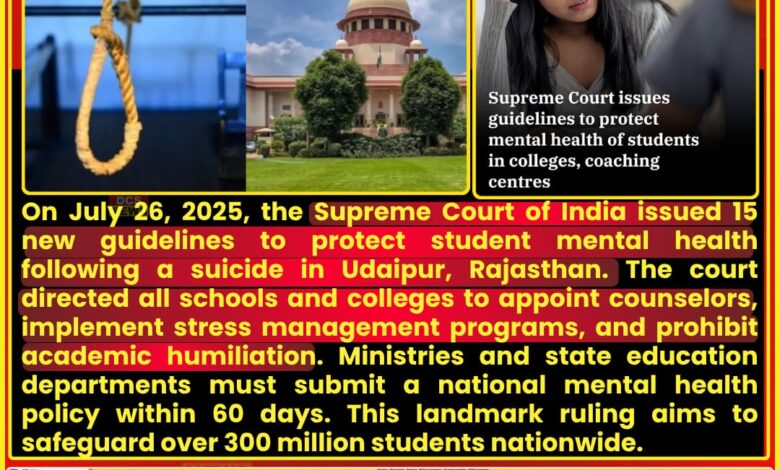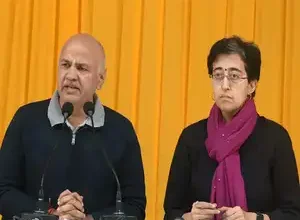
July 26, 2025 | Location: New Delhi, Udaipur
In a historic ruling on July 26, 2025, the Supreme Court of India issued 15 key guidelines to address the worsening mental health crisis among students. This comes in response to the recent suicide of a student in Udaipur, Rajasthan, which sparked national outrage and concern over academic pressure and institutional neglect.
The Udaipur Case That Sparked Change
The suicide of a student from a reputed institution in Udaipur earlier this month drew widespread attention. The court emphasized that the tragedy could have been prevented with appropriate mental health support systems in place.
The Supreme Court, led by Justice Sanjay Kishan Kaul, observed that “educational success should not come at the cost of life.” The bench insisted that mental health in academic institutions must be treated with urgency and seriousness.
Highlights of the Supreme Court’s 15 Guidelines
The court’s directive mandates:
-
Appointment of trained counselors in all educational institutions
-
Creation of a mental health policy for students at national and state levels
-
Regular mental health audits in schools and colleges
-
Introduction of stress management programs in the curriculum
-
Prohibition of public shaming or humiliation of underperforming students
-
Creation of anonymous grievance redressal cells
-
Mandatory sensitivity training for faculty and administrative staff
-
Strict monitoring of bullying and harassment cases
-
Implementation of early intervention systems for at-risk students
-
Inclusion of mental health awareness in teacher training modules
-
Collaboration with psychologists and public health experts for support
-
Regular submission of reports to the Ministry of Education
-
Appointment of state-level education mental health officers
-
Annual data collection on student wellbeing metrics
-
Establishment of an independent oversight body for compliance
Immediate Action Demanded
The Ministry of Education, University Grants Commission (UGC), and all state education departments have been ordered to submit an actionable roadmap within 60 days. The court has also directed that funds from existing educational and public health budgets be allocated immediately to initiate the reforms.
Nationwide Impact Expected
The judgment is expected to impact over 300 million students across India, spanning from primary schools to universities. Mental health experts have welcomed the move, calling it a “pivotal moment” in India’s educational history.
“This is the first time mental health is being institutionally recognized as a legal and educational priority,” said Dr. Ananya Mehta, a child psychologist in Delhi.
Budget Implications
Though no fixed figure has been set yet, preliminary estimates suggest that ₹1,000 crore may be needed annually to implement the reforms across India. States have been asked to use existing education and public health funds effectively and submit utilization reports quarterly.
Accountability & Monitoring
An independent monitoring committee, consisting of retired judges, child psychologists, educationists, and social workers, will be formed to oversee the implementation of these directives. The court has warned that any non-compliance will attract legal action under relevant constitutional and human rights provisions.
A Call for Compassionate Education
The court concluded its order by stating:
“The purpose of education is to nurture minds, not break them. A student must be supported, not sacrificed.”
With this ruling, the Supreme Court has laid the foundation for a healthier, more compassionate education system in India.










